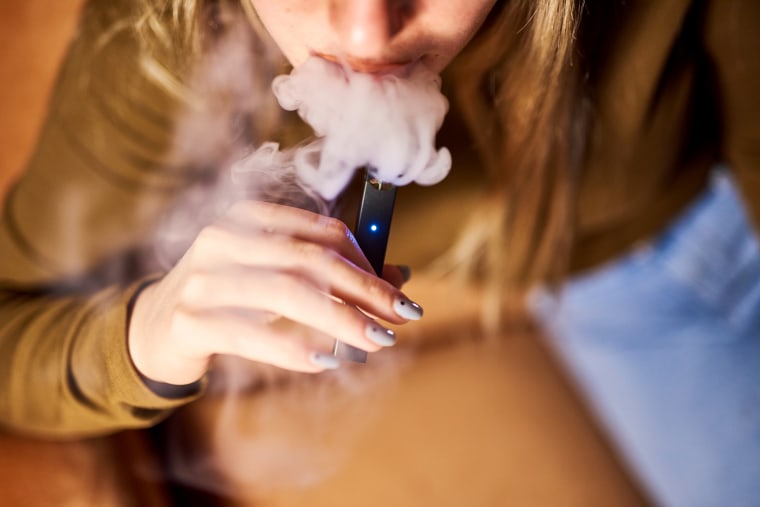Testimony on Capitol Hill on Wednesday painted e-cigarette manufacturer Juul Labs Inc. as a calculating, ruthless company that continues to target impressionable children, despite claims that it's trying to curb youth access to its products.
Physicians and members of an advocacy group against teen vaping testified in front of the House Committee on Oversight and Reform's subcommittee on Economic and Consumer Policy.
"We're hoping to give voice to the families whose lives have been upended by the predatory practices of Juul, also known as Tobacco 2.0," Meredith Berkman, co-founder of Parents Against Vaping E-cigarettes (PAVE), said in an interview with NBC News before Wednesday's hearing began.
Berkman and others on the panel suggested that Juul's marketing practices on Instagram and other social media platforms targeted young people, and that flavors such as mango and mint were appealing to kids. What's more, Juul pods' sleek design has allowed kids and teenagers to hide their vaping from parents, they said.
The devices emit very little visible vapor, don't smell like typical cigarettes and look just like computer flash drives.
"It doesn’t mean you’re a bad parent if you don’t know your kid is Juuling. It’s stealth by design," Berkman said during her testimony.
Teen vaping has surged in popularity in recent years. In February, the Centers for Disease Control and Prevention reported a 78 percent increase in high school students using electronic cigarettes from 2017 to 2018, and an almost 50 percent increase among middle school students.
"Every one of my teenage patients — and even many of my preteen patients — either uses e-cigarettes or has friends who use them," Dr. Jonathan Winickoff, a pediatrician at Massachusetts General Hospital and member of the American Academy of Pediatrics, said in his testimony.
Indeed, teenagers consistently say they have friends who vape, or have struggled with addiction themselves, including Philip Fuhrman, 16. Fuhrman's mother, Dorian, is another PAVE co-founder.
Philip told NBC News he started using e-cigarettes in 8th grade. He soon became hooked on nicotine, and had to work hard to quit the addiction.
"I thought about how it was disrupting my family and causing fights. I thought about how it was hurting my physical body and my emotional state, as well," he said.
During testimony, Winickoff explained how vaping can be particularly harmful to bodies and brains that are still developing, with the potential for seizures and respiratory health problems, as well as lifelong nicotine addiction.
While there's near universal agreement that kids should avoid tobacco, some raise concerns that prohibiting flavors and restricting access to e-cigarettes would deter adults from using the devices to quit smoking combustible cigarettes, which are well known to cause disease and death.
"If this is a type of product that is consumer friendly and is more apt to be used [than other nicotine-replacement products], then we ought to look for ways to leverage that opportunity," said Dr. Raymond Niaura, a clinical psychologist in the College of Global Public Health at New York University.
Although Wednesday's hearing focused on Juul products and marketing practices, it did not include any representatives from the company itself.
That will come Thursday, when two Juul executives are scheduled to testify in front of the same committee.
In a statement to NBC News, a spokesperson for Juul said the company welcomes the opportunity to talk about its role in helping adult smokers transition away from combustible tobacco, as well as Juul's efforts to prohibit kids from accessing its products.
"We strongly advocate for Tobacco 21 legislation, we stopped the sale of non-tobacco and non-menthol based flavored JUULPods to our traditional retail store partners, enhanced our online age-verification process, strengthened our retailer compliance program with over 2,000 secret shopper visits per month, and shut down our Facebook and Instagram accounts while working relentlessly to remove inappropriate social media content generated by others on those platforms," the statement read in part.
One of Juul's most vocal critics, Matthew Myers, president of the Campaign for Tobacco-Free Kids, is scheduled to testify alongside the Juul executives Thursday.
Follow NBC HEALTH on Twitter & Facebook.


